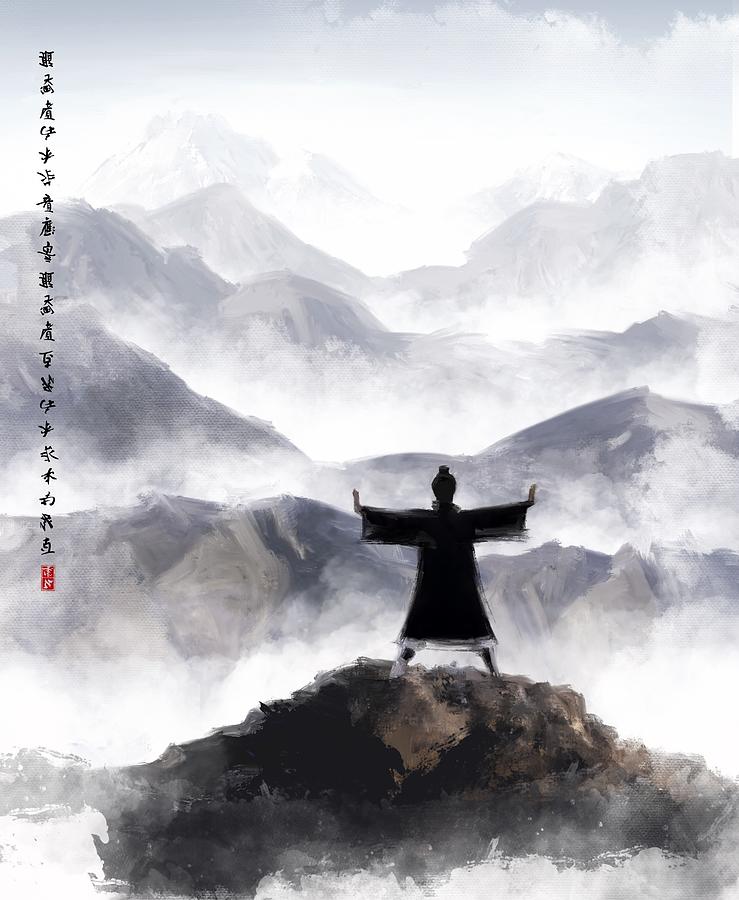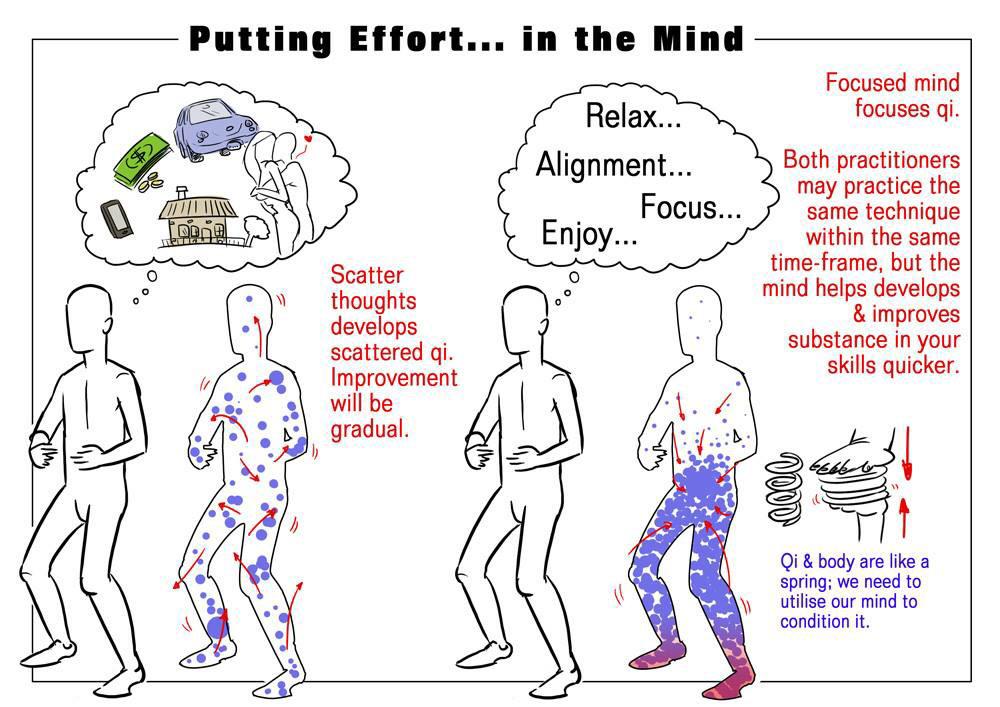The video commentary on hexagram #18. Members of the Yi Fa Society have access to a second video with more advanced insights.
The Yi Fa Society
The official public blog of the Yi Fa Society, a mystical order dedicated to the teaching and practice of self-transformation through the study of long-hidden practices of internal alchemy.
Bagua

Monday, March 28, 2022
Monday, December 13, 2021
Spontaneous Body Activity During Qi Gong Practice
On more than one occasion, people have asked me about something that has happened to them during Qi Gong practice, and how to deal with it. They have told how during practice, their body might spontaneously make slight movements, not like involuntary twitches but rather what seems to be a natural adjustment, a shift in stance or readjustment of positions of the arms, legs, head or back, but one they had not consciously thought to do. Similarly, some practitioners have asked about spontaneous unexpected body activity that happens during Qi Gong, like suddenly starting to repeatedly yawn, belch, or cough; or to have some kind of welling up of a strong emotion in mid-practice that seems not to arise from one's conscious thoughts or feelings.
What you're experiencing with these phenomena are spontaneous body-adjustments during Qi Gong practice. In some cases, they are 'corrections' to things like your posture or the position of your arms.
Subtle muscular adjustments are a very common form of body adjustment.
Yawning is a very common side-effect of the releasing of blocks that impair the circulation of Qi, they're a good thing (unless they're happening because you're very tired).
Coughing is a less common adjustment, but it's not too unusual either, particularly if in regular circumstances you are breathing too tightly, perhaps due to stress, and this is a reaction to the relaxation of your breathing. Belching can happen as a result of relaxing the body as well.
Emotional experiences are part of the mind-body connection, as you relax and release tensions in the body this in turn releases certain emotional tensions you might not even have been aware of.
Generally, these are all OK, and are a sign that you are improving at Qi Gong practice, as long as you do not radically alter your Qi Gong form (small adjustments are fine and good, but for example wanting to stretch out the back is something you should do in between exercises).
The emotional effects are alright too, but the key is that you should let them happen while at the same time not being carried away by them. Let them pass and don't resist them, but don't feed them.
Friday, July 23, 2021
Confucius On Cultivation
The following is attributed to Confucius, as recorded by his grandson, from the Zhong Yong:
Truth is the way of Heaven.
Developing Sincerity is the way of Humanity.
If you can be effortlessly Sincere, without lust of result, and walk embracing the Middle Pillar, then you have become a Sage.
If you are practicing at becoming Sincere, you must find your Virtue and cleave to it.
You must study it generally, investigate its particulars, contemplate it with care, perceive it with clarity, and practice it at all levels.
When there is a gap in your understanding, or you haven't yet reached the point in your practice where it is really effective, don't just abandon it.
When there is something you have investigated, but not yet fully understood, don't just abandon it.
When there is something you have not yet been able to perceive, or can perceive but not with clarity, don't just abandon it.
When there is something you have not yet practiced, or not yet practiced to a certain level, don't just abandon it.
If someone else can get it in a single try, I will try it a hundred times.
If someone else gets it in ten tries, I will try a thousand times.
If you can persist in following this Path, even if you are stupid, you will become Enlightened. Even if you are weak, you will achieve Power.
Thursday, July 1, 2021
Thursday, April 29, 2021
"Stale Qi" Part II
The previous post on this blog, regarding the matter of "stale Qi", had a number of comments on social media from ordinary practitioners as well as serious Qi Gong practitioners or alleged teachers.
Among these comments, some were in agreement, others strongly disagreed and tried to argue that "stale qi" or other "varieties" of Qi are a real phenomenon.
However, the most interesting comments came from people who suggested that whether or not the phenomenon itself was real, my statement about it wasn't relevant because it doesn't really matter in terms of effects. In other words, even if "stale" Qi (or any of the many other types of descriptors of Qi, including things like "scattered qi", stolen qi, sinking qi, rising qi, boiling qi, small qi, long qi, weak qi, strong qi, still qi, hard qi, etc.) wasn't actually real and Qi is just Qi, the description of these things as 'types' of Qi can be helpful for a student to understand what they're working through and it can potentially help them to engage with Qi Gong practice.
Now, first of all, if you think about all those statements being attributed to Qi, you can see that they're not really talking about Qi itself at all, but rather about how YOU process Qi.
(It's not the Qi that's scattered, it's you)
It is technically correct, that from a 'practical' point of view, it doesn't immediately matter whether it's the Qi that's "bad" or your body that is "bad" due to your failure of cultivation and/or lack of Virtue.
However, in the bigger picture, there is an important difference!
If people believe it's the Qi that's bad, they can go looking for magic potions and quick fixes and fake Wu or plastic new-age "taoists" who will do "energy cleanses" that will "fix their Bad Qi".
On the other hand, if they realize Qi is Qi, and the problem is THEMSELVES, they might understand that the only way to fix the problems are by their own discipline and virtue.
So that's a HUGE difference.
Sunday, March 21, 2021
Can Qi Really go "Stale"?
Qi is really just Qi. But at times it is useful in speaking about Qi, in the context of things like Qi Gong, cultivation practice, esoteric studies or traditional healing to describe particular interactions of Qi with our body or our consciousness through the use of metaphorical conditions. However, this has led over the years to different systems or teachings in esoteric schools to end up using a variety of terms, like "positive qi", "negative qi", "Yin Qi" or "Yang Qi", "Natal Qi", "Active Qi" or "Stale Qi"; but all of these gradually came to be thought of as different "types" of Qi, which is inaccurate.
As an example, let's consider the example of "stale Qi":
There are two ways to understand Qi in any way that Qi could be said to be 'stale'. The term is a deceptive because it implies that it is the Qi that is bad or corrupted or in some sense different from normal Qi.
The first is in the sense of physical well-being, where if someone has failed to be natural for a long time, developing harmful physical habits that lead to physical tension, a failure to breathe naturally, tightness/restriction of the body in varied ways, then the circulation of Qi through the body is not open and fluid, and so Qi will tend to accumulate only in certain areas of the body and not others, leading to physical disharmony. Notice that it is not in fact a problem with Qi, or that Qi is any different, it is a problem with the body and its ability to be open and receptive and fluid in relation to Qi.
The second is in the sense of understanding Qi not only as life-force but as Will. Our will is directed to certain things. We put our will into certain things. This includes things that must be done in the immediate sense, like very ordinary things, and also things that we are trying to achieve in a bigger sense, but it also means anything we've intentionally or unintentionally invested ourselves in. This investment means that some of our will, our Qi, will be directed in certain ways, and normally this isn't a problem, it's perfectly normal. But if we have invested our will into things that we cannot resolve, into things that are unreal, or things that are no longer real, our attention and our emotions (fear or desire) and our mind and our pain clinging to those things in spite of their unreality, then the Qi gets locked in to being invested in that. Part of our will is stuck there.
That manifests also in the body, as tension (tension here meaning anything from physical rigidity to posture, to breathing, to other symptoms like sleeplessness or intestinal troubles, to serious disease). The Qi there is 'stale' because it is stuck clinging to something unresolved and that cannot ever be resolved in the usual way. Once again note that the problem is not with Qi, or that the Qi is different, but rather a problem that our mind is locking-in our Qi, limiting its fluidity because of our obsessions.
So the ways to resolve these sorts of problem are either by physical practice (Qi breathing) or by Virtue (through self-inquiry). The former uses the body to loosen the bonds of the mind, the latter uses awareness to loosen these bonds. Typically, a combination of both is best.



